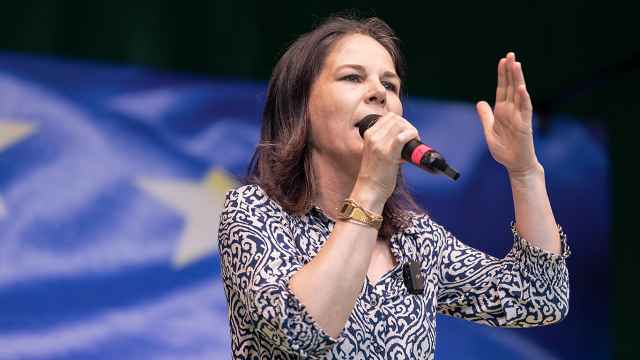As the ruble falls and the Central Bank continues to revoke lenders' licenses, investors are safeguarding their savings in that most tangible of assets: real estate.
There were 20 percent more property transactions in Moscow in the first two months of 2014 versus the same period last year, according to Est-a-Tet, a realty firm specializing in selling property in new developments in the Moscow region.
The surge was inspired by the weakening ruble and the Central Bank's purge of the banking sector, which saw 30 banks lose their licenses in 2013, said Vitaly Ivanov, vice president of realtor Megapolis-Service.
There are two typical buyers, Ivanov said: investors who previously held their money in currencies or the banking system and are now turning to real estate, and people who were already planning on buying property.
"The increase in the dollar and euro exchange rates are spurring those who had planned a purchase but hesitated for some reason," said Alexei Boldin, general director of realty firm Magistrat, a subsidiary of developer Inteko.
While both new property sales and the secondary market have seen a surge in sales, it is newly built apartments outside the Moscow's city center that are selling fastest, Ivanov said.
"If in Moscow you can buy an apartment in an old building, in the nearby Moscow region, literally 10 minutes away, you can get a new apartment one and a half times larger for the same money," Ivanov said.
Developers are capitalizing on this interest with a range of projects offering apartments at affordable prices, he said.
Some developers in the elite segment, where prices are frequently fixed in dollars, have turned to creative pricing strategies in an attempt to reassure buyers concerned with the falling ruble.
Developer Barkli, for instance, has fixed an exchange rate of 34 rubles to the dollar for their clients, about 6 percent lower than then the Central Bank's exchange rate.
Volatility in the exchange rate has a conflicting effect on the real-estate market; while apartments become a more attractive investment, the atmosphere of economic uncertainty encourages a "wait-and-see approach," Barkli's commercial director Yekaterina Fonareva said in a statement.
"Hence it is extremely important for developers to adjust their pricing policy," Fonareva said.
Reactions to the unstable ruble have varied, with some developers leaving their dollar prices unchanged, others offering a fixed exchange rate and still others "selling at the current rate but offering to return the difference if the dollar goes down in value," said Vladimir Bogdyanuk, head of Est-a-Tet's analytics and consulting center.
At the same time, the increase in demand is boosting prices. Developers have hiked ruble prices on some projects by between 5 and 20 percent, which could ultimately have a negative impact on the market, Bogdanyuk said.
"The heightened demand will die down in a few months, which, combined with the increase in prices, could lead to stagnation," he added.
Prices in the business class segment have risen between 2 and 2.5 percent since December, Magistrat's Boldin said.
Average dollar prices, however, for the overall Moscow real estate market fell 1.1 percent in January and 2.5 percent in February, finishing at about $4,870 per square meter in the final week of February, Irn.ru estimated.
The dip in dollar prices is the direct result of the weakening ruble. While in the 1990s real estate prices were denominated in dollars, now they are primarily fixed in rubles, with the exception of luxury properties.
As a result, the average price is trailing behind the strengthening dollar, analysts from Irn.ru said.
Worries about the economic consequences of Russia's military presence in Crimea could also put an end to the buying rush, said Sergei Shloma, head of the secondary housing department at real estate firm Inkom, in a statement on the company's website.
"The initial demand has already been satisfied, and when there is political uncertainty abroad, one should not count on market activity," Shloma said.
Contact the author at d.damora@imedia.ru
A Message from The Moscow Times:
Dear readers,
We are facing unprecedented challenges. Russia's Prosecutor General's Office has designated The Moscow Times as an "undesirable" organization, criminalizing our work and putting our staff at risk of prosecution. This follows our earlier unjust labeling as a "foreign agent."
These actions are direct attempts to silence independent journalism in Russia. The authorities claim our work "discredits the decisions of the Russian leadership." We see things differently: we strive to provide accurate, unbiased reporting on Russia.
We, the journalists of The Moscow Times, refuse to be silenced. But to continue our work, we need your help.
Your support, no matter how small, makes a world of difference. If you can, please support us monthly starting from just $2. It's quick to set up, and every contribution makes a significant impact.
By supporting The Moscow Times, you're defending open, independent journalism in the face of repression. Thank you for standing with us.
Remind me later.





